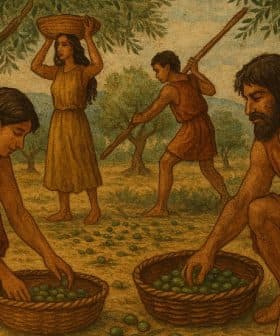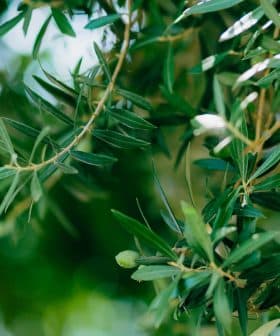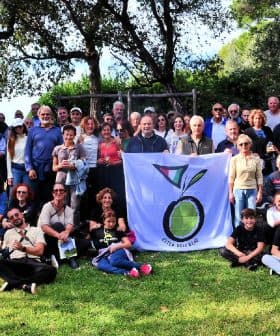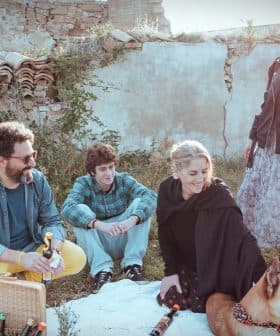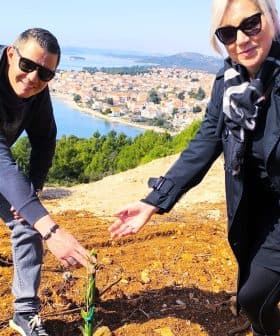Olive Oil and Soparnik Are Indispensable for Croatians at Easter
Olive trees and extra virgin olive oil play important roles in Croatian Christians' celebrations of Holy Week, especially in the flagship dish, Soparnik.
 Soparnik, also known as Uljenak and Zeljanik (Photo: Ante Mekinić)
Soparnik, also known as Uljenak and Zeljanik (Photo: Ante Mekinić) Croatian Christians celebrate Easter with olives and olive oil, starting with the blessing of olive branches on Palm Sunday. The Roguljić family in Kučina, Croatia, continues the tradition of producing Soparnik, a traditional pastry, using high-quality ingredients like olive oil and naturally grown chard.
Croatian Christians cannot imagine the most important holiday of the year, Easter, without olives and olive oil. The Holy Week began on Palm Sunday with the blessing of olive branches.
“On entering Jerusalem, the people cheered Jesus, waving olive and palm branches,” said Milan Zgrabljić, the archbishop of Zadar, Croatia’s fifth-largest city.
After the blessing, Zgrabljić led the procession to the Cathedral of Saint Anastasia in the center of the ancient city, considered older than Rome. Everyone held olive branches in their hands.
See Also:Award-Winning EVOO, Local Cuisine Delight the Senses on Hvar“It is not enough to hold olive branches in our hands; it is necessary to turn olive branches into trophies of love, trophies of victory over hatred, unrest, quarrels, intolerance, unrest, quarrels, discords and every form of immorality,” Zgrabljić said.
The Holy Week continues on Maundy Thursday with the mass of consecration of olive oils donated by olive growers from Žman on the island of Dugi Otok. The olive oils were transported to Zadar by bracera, a traditional boar.
The bishop will bless three oils: sick oil, used to anoint the sick; catechumen oil, used to anoint the baptized; and chrism, a mixture of olive oil and fragrance (mainly balsam), used in baptisms, confirmations and priestly and episcopal ordinations.
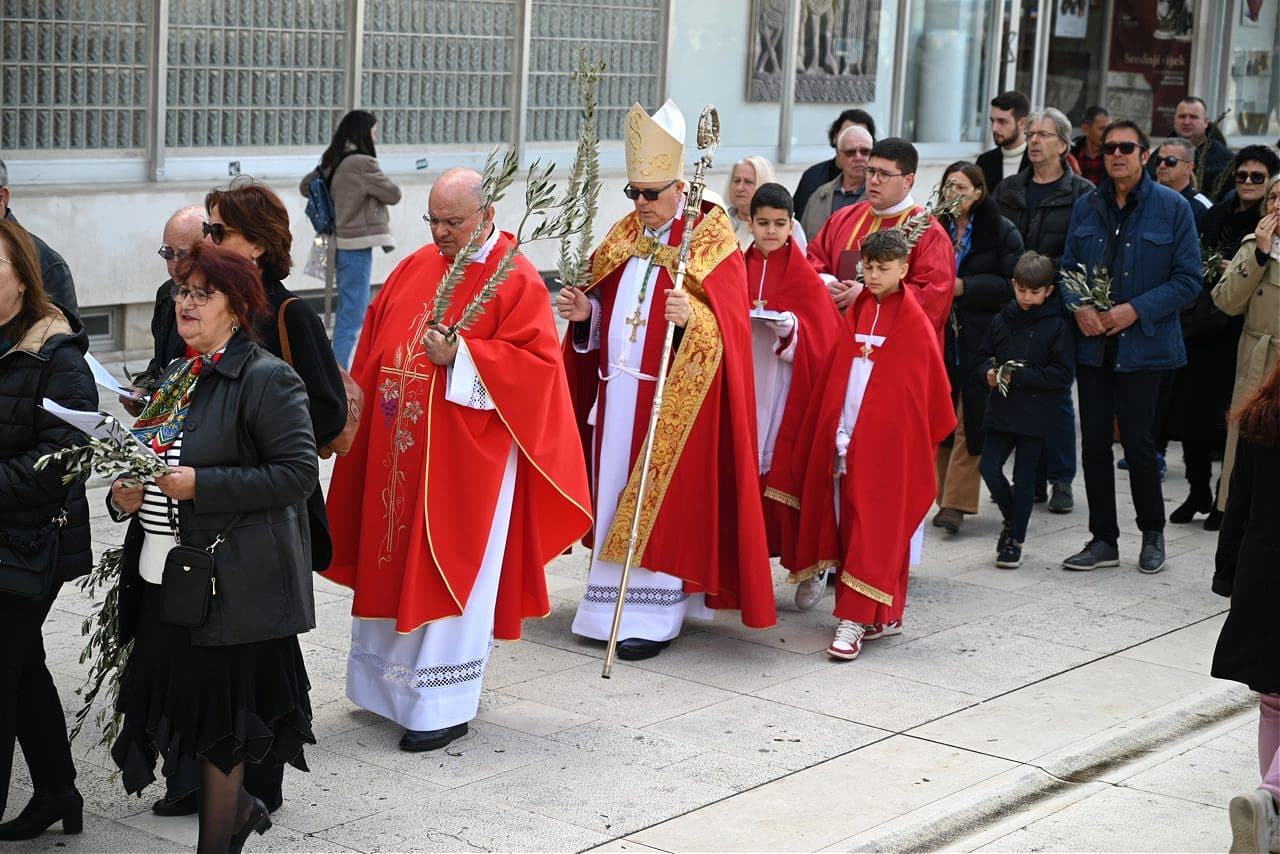
Blessing of olive branches and procession in Zadar (Photo: Foto: Ines Grbić)
Good Friday commemorates Jesus’s passion, crucifixion and death. On that day, fasting is obligatory for believers.
In continental Croatia, beans, dried fruit, compotes, cheese strudels and dough with walnuts and poppy seeds are most often eaten, along with freshwater fish such as carp and pike.
In coastal Croatia, including Istria, Kvarner and Dalmatia, locals break their fast with a variety of seafood and saltwater fish, accompanied by extra virgin olive oil. Along with numerous delicacies of the Mediterranean diet, the special one is Soparnik.
“Once upon a time, it was the food of the poor, but today it is widely produced and consumed,” said Josip Roguljić, from Kučina, a small town on the southern slopes of Mount Mosor.
Kučine is a suburb of Solin, about ten kilometers from Split, the largest city in Dalmatia and the second-largest city in Croatia.
“The production of Soparnik is a family tradition,” Roguljić said. He is the youngest member of OPG Roguljić, a family business consisting of his mother, Mirjana, father, Marin and older brother, Ivan, along with him and his wife, Antea.
They continue the tradition of their ancestors, growing 500 olive trees and tending 180 beehives in Kučine and on the island of Šolta.
They produce cold-pressed extra virgin olive oil, honey and other bee products. At the foot of Mount Mosor, they have a corral with 30 heads of cattle, cows and calves. The autochthonous varieties of figs Poljarica, Bilica and Mletkinje grow in the Kučina field with seasonal vegetables.
“Agriculture is an open-air factory,” Roguljić said. “That’s why we deal with several activities. You never know when one will fail. If the olives do not bear fruit for one year, we have bee products and vice versa. Of course, it’s best when everything works out.”
A formally trained agronomist, Roguljić also prepares Soparnik, a traditional pastry.
“My mother’s and father’s families have been producing Soparnik for time immemorial,” Roguljić said. “The desire to preserve tradition prompted us to continue in the footsteps of our ancestors and save old recipes and methods of production from being forgotten.”
See Also:Iconic Lebanese Breakfast Receives UNESCO RecognitionSoparnik, also called Uljenak and Zeljanik, is a traditional dish originating in the hinterland of Split. This simple dish was prepared using ingredients that were available to almost every household: wheat flour, red onion, olive oil and garlic.
The dough is kneaded from wheat flour and rolled out on sinia, round tables. The filling is made with Swiss chard, which is washed, finely chopped and salted to soften it. Thinly sliced red onion is added, then the moisture is squeezed out by hand so it is not too wet. Olive oil is added last.
The filling is spread over one stretched crust and covered with the other. The dough is stretched using a wooden roller. The pie is baked on the stove and covered with embers. When the pastry is ready, it is coated with oil and garlic.
In the past, Soparnik was prepared only on fasting days. However, since its inclusion on the UNESCO Intangible Cultural Heritage List, it has become indispensable at every Dalmatian festival.
Although some food producers started mass-producing the pastry, the Roguljić family still follows the traditional recipe and production method.
“The essence of a good Soparnik is in high-quality, naturally grown chard, extra virgin olive oil,” he said.
The most common preparation method is Poljica, which is savory. However, there are also two sweet versions of the dish called Kučinski and Žrnovački. The preparation method is the same until the final stage, when ground walnuts and raisins are added with olive oil. Unlike Žrnovački, it is sweetened with sugar and chopped almonds or walnuts.
“We received a record number of orders, and they continue to arrive,” Ivan Roguljić said. Freshly baked Soparnika, olive oil, honey and bee products are delivered to the home addresses of well-known customers, and their numbers are increasing.
The traditional Easter table in Croatia does not tolerate many experiments: pinca, kuglof, boiled ham, horseradish, spring onions and boiled eggs are typically served for breakfast.
For lunch, a roast is usually prepared: veal and potatoes, less often poultry, pork or steaks, and most often young roasted lamb, with spring onions and new potatoes.
The recently appointed United States ambassador to Croatia, Nathalie Rayes, also could not resist the traditional meal during a recent visit to Slunj, near the Plitvice Lakes in Lika. She ordered this traditional delicacy in a well-known restaurant, which was served with the indispensable spring onion.
A lot of you suggested that I should try janjetina. And I did, here in Slunj and it was absolutely delicious. No wonder it is so popular! pic.twitter.com/S3POGZicgo
— Ambassador Nathalie Rayes (@USAmbCroatia) March 24, 2024
“A lot of you suggested that I try the lamb. And I did, here in Slunj, and it was absolutely delicious. No wonder it’s so popular,” she wrote on social media platform X with a video of her sampling the lamb for the first time.
According to recent research, most Croatians intend to spend €50 to €70 on Easter lunch preparation, 20 percent less than last year. However, olive oil, Soparnik, and lamb are not among the ingredients they plan to cut back on.
Share this article



